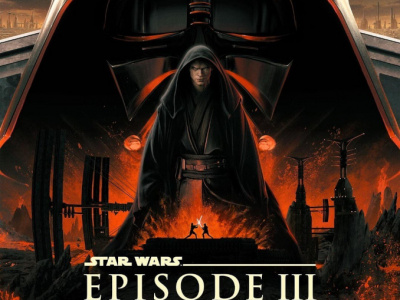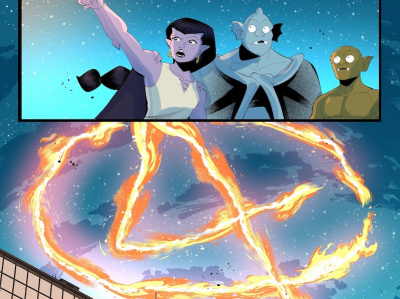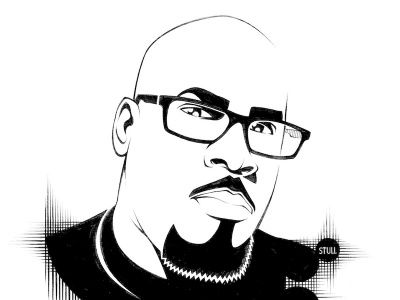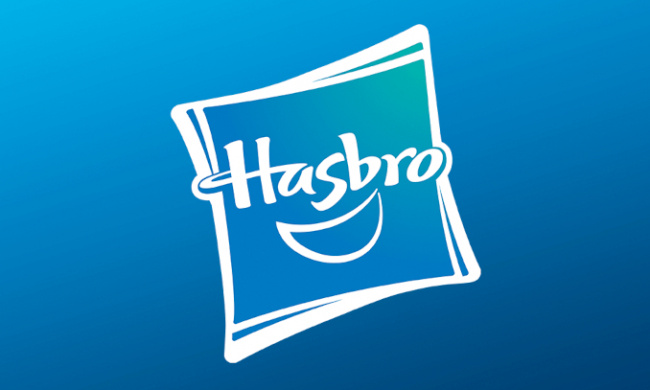
A few weeks ago at the San Diego Comic-Con, we sat down with DC President and Publisher Paul Levitz for our annual talk about the state of the comic business and DC's place in it. In Part 3, we talk about DC's investment in Japan, and how that relates to its strategy for a flow of content for its CMX line, the launch of DC's new Minx imprint, and the opportunities for cross-fertilization of content and customers with MMORPGs. In Part 4, we talk about DC's film pipeline and strategy, Levitz's take on DC's upcoming releases, and how the changes in the market are changing comics. In Part 1, we talked about the current state of the market and its prospects. In Part 2, we talked about DC's investments in Webcomics.
We'd like to continue the discussion of Flex and put it in the context of CMX. One of the issues with CMX has been that some major Japanese manga publishers are tied up because they've got US arms that are publishing their material here or they have uber alliances like the Kodansha-Random House relationship. Is one of the reasons that you invested in Flex to sort of move upstream in Japanese content and give yourself a better pipeline?
I think the investment in Flex fits what our most fundamental strategy was in
There were very vigorous popular culture industries in many other countries (think Bollywood as an example), but mostly without worldwide impact.
The point you raise about the issue of scarcity of the great stuff for American reprinting is certainly a fair point. Viz obviously has a close relationship with its two parent companies. Kodansha has a close relationship with Random House. We have ongoing conversations with everybody who publishes good manga about what the right ways of working together are, because there's so much good stuff that really none of the alliances cover 100% of the great material that's available, but we'd like to find ways of getting the best stuff we can, and in this case being involved from the very beginning certainly presented a unique opportunity.
We wanted to talk a little bit about Minx, the new DC imprint, which was another event since the last time we talked. It looked to us from the first numbers we saw that the direct response was stronger than the bookstores which was sort of the opposite of what I would've expected. Can you comment on whether you're finding that the case and what the overall response is on Minx?
I don't think the direct absolute numbers were larger than the bookstore numbers, but we certainly had an enormous enthusiasm in the direct market that was above and beyond what we were initially expecting which was great. There was a lot of passion for reaching out to the other audiences. We got some good support in the bookstores for the launch.
It's a challenging project. You're reaching out to a very different kind of audience. There's not a natural connection immediately there day one that says these people are walking past this shelf, put it out and make it happen, but we're nurturing it, we're doing ok, and we think the material is very strong, and we're optimistic that it will continue to build from here.
DC recently announced that you were going to do a comic based on the World of Warcraft. We've been finding that videogames are very important drivers of print and other products. This is a big move in that direction (Blizzard recently announced that they'd hit nine million subscribers for World of Warcraft). What do you see as the relationship between the audiences for MMORPGs and for comics in both directions--both what you'd like to do with the Blizzard deal and what are the opportunities for DC?
We announced a couple of years ago when we began work with Sony Online that we're building the DC universe online. We spent a couple of hours looking at that yesterday, and that continues to come along. It's been a major project for us out of Wildstorm, where Jim's been very seriously involved in the project from the beginning and we put together a team of digital artists that have been recreating the DC universe for online with an incredibly beautiful result.
It's an enormously complicated process of translation. The comic book guys don't speak code naturally. It's not our world. The online guys, who include many comic fans don't speak the secret code of how comics are made underneath the reading experience. We've been trying to put the best of both worlds together to build it. It seems to me a very natural relationship for the comic book world. The fantasy of living in these environments, of acting out in them, relates directly to a fundamental fantasy experience of reading comics--you're projecting yourself into the environment. We certainly know from readership studies over the years and just the anecdotal evidence of how many of our creative people have disappeared out of a deadline situation into a role-playing world, that it's a very powerful entertainment experience.
I think both are really important opportunities for us. If we do it right when we launch the online game, and we're still quite a ways down the road from the launch point, we'll have created a tool that will enable a generation of people who enjoy the online experience as one of their fundamental entertainment patterns to fall more deeply in love with our characters, and some of them will then, I believe, migrate from there to our comics, particularly if we have the right comic material available for them at that time, and others will just love the characters for the multimedia forms they're available in.
The opportunity of working with Blizzard on World of Warcraft is a great one because as you say, they've got a tremendous and passionate subscriber base. They tell a kind of story that has always been one that has been interesting to the comic book world, but that we very rarely succeeded in finding a major audience for, or sustaining an audience. Conan is the massive exception to that rule, but if you take Conan out of the equation there hasn't been a sustaining homerun in comics in this genre, at least in a while, and we're very optimistic that World of Warcraft may be that, and also provide the opportunity again to bring new people into comics.
You talked about the DC MMORPG and the opportunity to migrate some of the people that might be introduced to the characters there back into print if you 'had the right material for them.' Can you put a year on the launch of the DC MMORPG and what do you mean by 'having the right material' for the people that might want to migrate from the online experience?
If we assume that a certain number of people love our characters but don't love reading the stories as we presently publish them, which I think is a fair assumption in a world where you can do twenty million people showing up for a Batman or Superman movie and only a very small percentage of those choose to pursue the character thereafter in reading (and I'm ignoring the television viewings, and the HBO viewings, and the DVD, and all of that math).
One of the barriers is that there's something in how we tell a story that isn't universally appealing or isn't as appealing as film. Maybe that's the depth and complexity of the backstory that comes along as baggage. Maybe that's the form we deliver it in. It's not surprising the graphic novels reach out to a more casual public than the periodicals because they're there on a sustained basis and they're more likely to be a complete story in one package where the periodicals you have to come in every week and you really have to go along on the more complicated ride. It's more satisfying if you want the more complicated ride but it's a deeper experience.
When we get to the stage of the massively multiplayer game one of the questions will be how you deliver something. Maybe it's a digital comic available uniquely in that form that you put on screen because the people there obviously love spending hours, and hours, and hours of their lives on screen. Maybe it's a print comic that is not delivered in the same fashion creatively as we've historically done with the characters. Maybe it's something that bridges a gap and ties in creatively to what's going on in the fiction of the game. There are a number of variables and we're fairly early on the path to figuring out how all those pieces come together but both we and Sony are very interested in the exploration of how to make all of that work, and I think that it's a great creative opportunity.
I think all of those things serve as 'gateway drugs' to the characters and to a deeper involvement in the print universe and you can bring them over into things that are more of our shared universe over time. Sony will be the one announcing dates along the way. I can't even tell you what the currently announced target date is. I don't really keep a close eye on that side of it.
Click here for Part 4.







